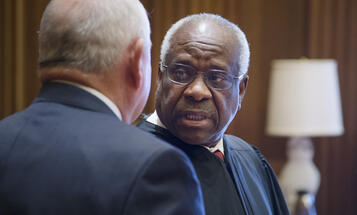
New Report “Billion-Dollar Democracy” Shows Unprecedented Impact of Big Money in 2012 Elections
Washington, DC – It took just 32 billionaires and corporations giving Super PACs an average of $9.9 million apiece to match every single dollar given by small donors to Romney and Obama in the 2012 election cycle, according to “Billion-Dollar Democracy” a new report by U.S. PIRG and Demos. Those small donations amounted to over $313 million from more than 3.7 million individuals.
“Americans who are wondering why it seems tougher to get ahead or even get a fair shake in today’s economy should look to big money politics for answers,” said Adam Lioz, report co-author and Counsel for Demos. “When a tiny group of wealthy donors fuels political campaigns, they get to set the agenda in Washington, and the rest of us are left to argue over that agenda.”
“Allowing special-interest money to fund attack ads on candidates distorts our democracy and gives corporations the power to determine winners and losers in our electoral process. The political marketplace must not be dominated by corporate wealth, because the strength of a citizen’s voice should not depend on the size of her wallet,” according to Brenda Wright, Vice President for Legal Strategies with Demos.
When a tiny group of wealthy donors fuels political campaigns, they get to set the agenda in Washington, and the rest of us are left to argue over that agenda.
The report provides a full and detailed analysis of all 2012 federal election spending and fundraising by campaigns and Super PACs. The data shows the undue influence of large donors, business interests and secret spenders in 2012:
- Nearly 60% of Super PAC funding came from just 159 donors contributing at least $1 million.
- Candidates for both House and Senate raised the majority of their funds from gifts of $1,000 or more; and 40 percent of all contributions to Senate candidates came from donors who gave at least $2,500. (Those donors are just 0.02 percent of the American population.)
- Corporate donations accounted for a large portion of the funds of two of top ten most active Super PACs, including 18 percent of Restore Our Future’s total contributions and 52.6 percent of those of FreedomWorks for America.
“The first post-Citizens United presidential election confirmed our fears that the new unlimited-money regime allows well-heeled special interests and secret spenders to drown out the voices of ordinary citizens,” said Blair Bowie, U.S. PIRG Democracy Advocate and report co-author.
The first post-Citizens United presidential election confirmed our fears that the new unlimited-money regime allows well-heeled special interests and secret spenders to drown out the voices of ordinary citizens.
“Billion-Dollar Democracy” also found that groups that do not disclose the source of their funds paid for well more than half of television advertising in the 2012 presidential race not sponsored by candidates or parties.
”These dark money groups hide key information about where they get their money from voters,” added Bowie. “Furthermore, because there’s no one to hold responsible for the content of their advertising, studies show they are far more likely to be misleading or just downright lying.”
Data in “Billion Dollar Democracy” also demonstrate to extent to which our big money system determines winners and losers, distorting our democratic process. Incumbents, for example, are big winners—outraising major challengers by 443% in the House and 316% in the Senate.
The report documents how vastly disproportionate influence by the “donor class” skews public policy, and concludes with specific solutions for every level of government to ensure that ordinary Americans can make their voices heard in financing electoral campaigns. These recommendations include amending the constitution, matching small political contributions with public funds, and requiring corporations to disclose political giving, among others.


